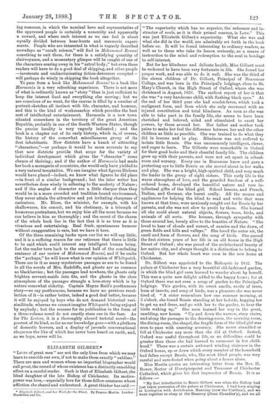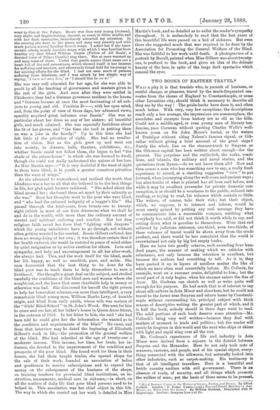ELIZABETH GILBERT.* "LIVES of great men" are not the only
lives from which we may learn to ennoble our own, if not to make them exactly" sublime." There are men and women whom no impartial biographer would tall great, the record of whose existence has a distinctly ennobling effect on a careful reader. Such is that of Elizabeth Gilbert, the blind daughter of the late Bishop of Chichester. Its motive- power was love,—especially love for those fellow-creatures whose affliction she shared and understood. A great thinker has said :—
• Elizabeth Gilbert, and her Work for the Blind. By Frances Martin. London : Macmillan and Co.
"The superiority which has no superior, the redeemer and in- structor of souls, as it is their primal essence, is Love." This was just Elizabeth Gilbert's superiority. What she was and what she did in the world, are admirably set forth in the book before us. It will be found interesting to ordinary readers, as well as to those who take its lesson seriously, as a means of instruction to the mind and redemption to the soul in bondage to self-interest.
But for her blindness and delicate health, Miss Gilbert must be reckoned to have been very fortunate in life. She found her
proper work, and was able to do it well. She was the third of the eleven children of Dr. Gilbert, Principal of Brasenose
College, and was born in the Principal's lodgings, close to St. Mary's Church, in the High Street of Oxford, where she was christened in August, 1826. The earliest report of her is that she was "a very handsome child, with flashing black eyes." At
the end of her third year she had scarlet-fever, which took a malignant form, and from which she only recovered with an injured constitution and total blindness. As soon as she was
able to take part in the family life, she seems to have been cherished and beloved, aided and stimulated to exert her powers, by those around her. Her father and mother took pains to make her feel the difference between her and the other children as little as possible. She was trained to do what they did in lessons and in play. Blindness was not suffered to
isolate little Bessie. She was uncommonly intelligent, clever, and eager to learn. The Gilberts were remarkable in Oxford
for their good looks and their cheerful family life. The children grew up with their parents, and were not set apart in school- room and nursery. Every one in Brasenose knew and gave a protecting eye to little Bessie as she moved about in her walks and play. She was a bright, high-spirited child, and very much the leader in the group of eight sisters. This early life in the warm atmosphere of love, and the guarded freedom of a well- ordered home, developed the beautiful nature and rare in- tellectual gifts of the blind girl. School lessons, and French, Italian, and German, she learnt orally. All the means and appliances for helping the blind to read and write that were known at that time, were anxiously sought out for Bessie by her parents, and she was not slow to profit by them. She learned all she could about natural objects, flowers, trees, birds, and animals of all sorts. She became, through sympathy with those around her, keenly alive to the beauties of Nature. "She loved to hear of clouds and sunset, of sunrise and the dawn, of green fields and hills and valleys." She loved the outer air, the smell and form of flowers, and the song of birds. She passed the first sixteen years of her life in an old house in the High Street of Oxford ; she was proud of the architectural beauty of her native city, and always thought it a distinction to belong to Oxford. But her whole heart was soon in the new home at Chichester.
Dr. Gilbert was appointed to the Bishopric in 1812. The palace at Chichester has a very beautiful old-fashioned garden, in which the blind girl soon learned to wander about by herself. This was a quite new delight added to the happy home ; for at Oxford there was not even a scrap of garden to the Principal's lodgings. This garden, with its sweet smells, rustle of trees, hum of insects, and song of birds, was a pleasure she was never
tired of. "A sister remembers how one summer morning, at 3 o'clock, she found Bessie standing at her bedside, begging her
to get up and dress, and go with her to the garden, to hear the birds waking up." She soon learned her way in the great, rambling, new house. "Up and down the narrow, steep stairs, and along the passages to the drawing-room, the morning.room, the dining-room, the chapel, the fragile form of the blind girl was seen to pass with unerring accuracy. She never stumbled or fell at Chichester any more than she did at Oxford. Indeed, Oxford was useful throughout life, as no difficulties could be greater than those she had learned to surmount in her child- hood:' There was a certain awkward winding staircase in the Oxford house, up or down which every member of the household had fallen except Bessie, who, like most blind people, was very careful and sure-footed when going about a house alone.
Miss Martin quotes an interesting letter from the Rev. H. Bower, Rector of Hurstpierpoint and Treasurer of Chichester Cathedral, which gives his first impression of Bessie. It is as follows :—
"My first introduction to Bessie Gilbert was when the Bishop had just taken possession of the palace at Chichester. I had been staying at Lavington with Archdeacon Manning (now the Cardinal), and we went together to sleep at the Deanery (Dean Chandler's), and we all went to dine at the Palace. Bessie was then very young (sixteen), very slight and fragile-looking, dressed, as usual, in white muslin, and with her dark spectacles, immediately attracted my attention. In the evening she went to the piano, and sang very sweetly and with much pathos, several familiar Scotch songs. I asked her if she knew oertain others, mostly Jacobite songs, with which I was familiar from hearing my dear friend William Harris (Fellow of All Souls', a devoted lover of Prince Charlie) sing them. She at once warmed up and sang some of them. Under that gentle aspect there came out a heart full of fire and earnestness, which showed itself in her interest for suffering and heroism, and afterwards found field for its energy in her untiring efforts for the blind. I had not seen much of persons suffering from blindness, and I was struck by her simple way of saying, 'I have not seen him,' or I should like to see it.'"
She was very well educated for her age, for she was able to profit by all the teaching of governesses and masters given to the rest of the girls. And soon after they were settled in Chichester, they had a German governess resident in the house,
and "German became at once the most fascinating of all sub- jects to young and old. Fraillein D—, with her open mind, and, from the point of view of those days, her advanced views, speedily acquired great influence over Bessie." She was as particular about her dress as any of her sisters; all beautiful girls, and much admired. She was especially fastidious about
the fit of her gloves, and "the time she took in putting them on was a joke in the family." Up to this time she had felt little of the privation of sight. She had no recollec- tion of vision. But as the girls grew up and went out into society, to dinners, balls, theatres, exhibitions, &c., whither Bessie could not follow them, she began to feel "the shade of the prison-house" in which she was doomed to dwell, though she could not really understand the nature of her loss. As Miss Martin says :—" It is very doubtful if the want of sight to those born blind, is in youth a greater conscious privation than the want of wings."
As she advanced to womanhood, and realised the truth that blindness was a bar to all that she believed to be the best things in life, her glad spirit became saddened. "She asked about the blind around her ; she found them set apart by their calamity as she was." Soon her thoughts went to the poor who were blind, and" who lead the enforced indignity of a beggar's life." She passed through the trial-years, from twenty-one to twenty- eight (which in most of our lives determine what we shall be and do in the world), with more than the ordinary amount of mental and spiritual suffering and conflict. But her firm religions faith saved her from that "fighting with dragons" which the young unbelievers have to go through, not without often getting worsted in the combat. Bessie Gilbert suffered, but from no wrong-doing of her own ; it was therefore certain that if her health endured, she would be restored to peace of mind either by quiet resignation or by active exertion for others. Love and sympathy, and help and encouragement in all her after-work, she always bad. This, and the work itself for the blind, made her life happy, as well as unselfish, pure, and noble. She soon discovered that the best thing to be done for the blind poor was to teach them to help themselves to earn a livelihood. She thought a great deal on the subject, and studied carefully the conditions of the blind men and women whom she sought out, and she knew that mere charitable help in money or otherwise was bad. She discovered for herself the right person to help her benevolent schemes,—a more than intelligent, a very remarkable blind young man, William Hanks Levy, of humble origin, and blind from early youth, whose wife was matron of
the "Girls' Blind School" in St. John's Wood. She sent for him to come and see her, at her father's house in Queen Anne Street, in the autumn of 1853. In her letter to him, she said "she had been told he could give her the information she wanted as to the condition and requirements of the blind." He came, and from that interview may be dated the beginning of Elizabeth Gilbert's work in life,—the promotion of the general welfare of the blind. She had inherited at the age of twenty-one a moderate income. This income, her time, her brain, her in- fluence, she devoted to the improvement of the condition and prospects of the poor blind. She found work for them in their
homes, she had them taught trades, she opened shops for the sale of their work, founded an association of ladies and gentlemen to receive subscriptions and to expend the money on the enlargement of the business of the shops, on training teachers for provincial blind institutions, on in- struction, amusements, medical care in sickness,—in short, on all the matters of daily life that poor blind persons need to be helped in. This association was her chief object in this life. The way in which she carried out her work is detailed in Miss
Martin's book, and so detailed as to enlist the reader's sympathy throughout. It is melancholy to read that the last years of this beautiful life were passed on a bed of sickness. But even there she suggested mach that was required to be done by the Association for Promoting the General Welfare of the Blind. She was faithful to her work until death. A photogravure of a portrait by Boxall, painted when Miss Gilbert was about twenty- one, is prefixed to the book, and gives an idea of the delicate beauty of the face, in spite of the large dark spectacles which conceal the eyes.



















































 Previous page
Previous page